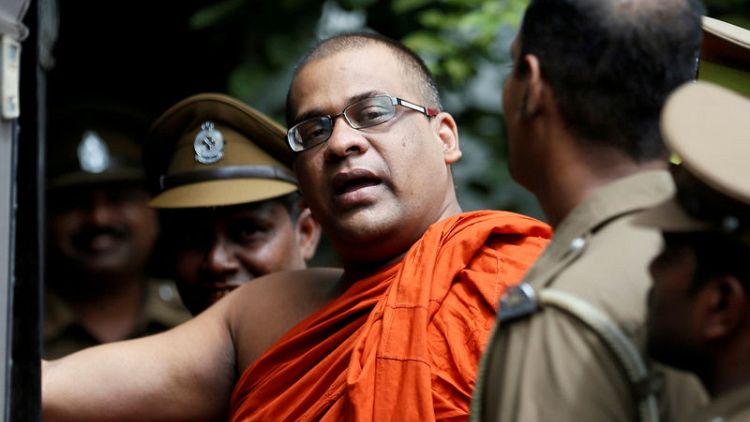COLOMBO (Reuters) - Sri Lanka President Maithripala Sirisena has pardoned a hardline Buddhist monk who is accused of inciting violence against ethnic minority Muslims and convicted of contempt of court, officials said on Wednesday.
The president's office did not give any reason for the pardon, which was condemned by a security thinktank as a blow to Sri Lanka's "battered rule of law".
The pardoning of Galagoda Aththe Gnanasara, head of the hardline Bodu Bala Sena (BBS) or "Buddhist Power Force", comes a week after extremist Buddhists attacked Muslim-owned homes, mosques and shops in apparent reprisal for the Easter bombings by Islamist militants that killed more than 250 people.
One person was killed in the anti Muslim riots.
Government ministers and Muslim leaders openly accused Gnanasara of stirring up violence against Muslims and Christians before his imprisonment, allegations he has denied.
Dilantha Vithanage, the chief executive of the BBS, said he had been informed that the president had pardoned Gnanasara.
"He will not be released today as the paperwork has not finished yet,” Vithanage told Reuters.
A Justice Ministry official told Reuters: "The president's office has sent the relevant documents to pardon Gnanasara monk to the ministry."
A prison spokesman was not immediately available for comment.
The Buddhist clergy has been pushing for Gnanasara's release. They have strong influence in Sri Lankan politics.
"A big blow to Sri Lanka’s already battered rule of law, sending precisely the wrong message after Easter attacks," Alan Keenan, Sri Lanka project director at the International Crisis Group, said on Twitter.
"A peaceful (Sri) Lanka requires all communities to feel safe & equal. Pardoning Gnanasara says impunity rules & Muslims, Evangelical Christians & Tamils are fair game."
He was sentenced to six years in prison in August over a 2016 incident when he interrupted a court hearing about the abduction of the journalist in which military intelligence officials were accused.
Gnanasara was also sentenced in a separate case in June for having threatened the journalist’s wife.
Since 2014, the monk has faced accusations in cases regarding anti-Muslim violence, hate speech, and defaming the Koran.
That year Gnanasara signed a pact with Myanmar’s Ashin Wirathu, who once described himself as “the Burmese bin Laden”, in what the duo called a bid to counter regional conversion efforts by Islamists.
(Reporting by Ranga Sirilal and Shihar Aneez; Editing by Alison Williams)
